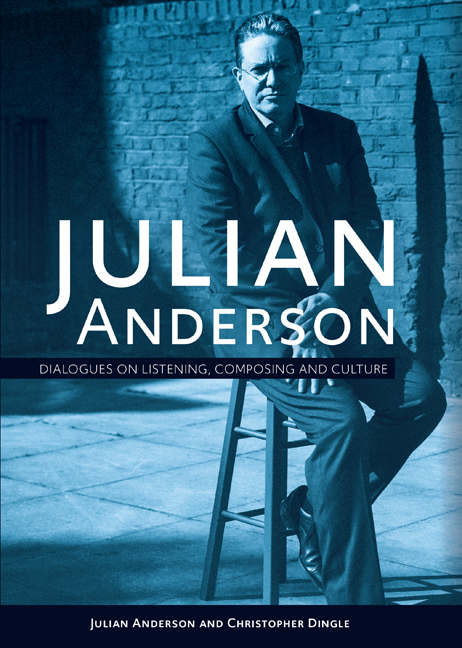Book contents
- Frontmatter
- Contents
- List of Illustrations
- Foreword
- Acknowledgements
- Introduction
- Prelude – Jeux: A Conversation Over Lunch
- Conversation One Origins
- Conversation Two Enthusiasms
- Conversation Three Training
- Conversation Four Dance
- Conversation Five Folk
- Conversation Six Composing (or Not)
- Conversation Seven Understandings
- Conversation Eight Beginnings (and Endings)
- Conversation Nine Puzzles
- Conversation Ten Singing
- Conversation Eleven Olly
- Conversation Twelve Memory
- Conversation Thirteen Opera
- Conversation Fourteen Practices
- Conversation Fifteen Outsiders?
- Conversation Sixteen Quartets
- Conversation Seventeen Advocacy
- Conversation Eighteen Partnerships
- Coda: Multiple Choices
- Chronology
- List of Personae
- Glossary of Musical Terms
- Macrotonality
- Catalogue of Published Works by Julian Anderson
- List of Recordings of Julian Anderson’s Music
- Bibliography
- Discography
- Index
Conversation Thirteen - Opera
Published online by Cambridge University Press: 16 September 2020
- Frontmatter
- Contents
- List of Illustrations
- Foreword
- Acknowledgements
- Introduction
- Prelude – Jeux: A Conversation Over Lunch
- Conversation One Origins
- Conversation Two Enthusiasms
- Conversation Three Training
- Conversation Four Dance
- Conversation Five Folk
- Conversation Six Composing (or Not)
- Conversation Seven Understandings
- Conversation Eight Beginnings (and Endings)
- Conversation Nine Puzzles
- Conversation Ten Singing
- Conversation Eleven Olly
- Conversation Twelve Memory
- Conversation Thirteen Opera
- Conversation Fourteen Practices
- Conversation Fifteen Outsiders?
- Conversation Sixteen Quartets
- Conversation Seventeen Advocacy
- Conversation Eighteen Partnerships
- Coda: Multiple Choices
- Chronology
- List of Personae
- Glossary of Musical Terms
- Macrotonality
- Catalogue of Published Works by Julian Anderson
- List of Recordings of Julian Anderson’s Music
- Bibliography
- Discography
- Index
Summary
Our conversations began in the weeks before the premiere of Anderson's opera, Thebans. Unsurprisingly, the opera was a recurrent topic in those early sessions and this, the longest conversation of this book, is an amalgamation of exchanges from before and after that important event. It starts with Anderson reflecting on the status of opera during his formative years and revealing that the idea for the plot dated back to having to translate Sophocles at school. Thoughts on the suitability or otherwise of potential plots for opera, and a preference for those that leave some things unsaid, lead on to the way that Thebans took Anderson's music into new territory. The difficulty of undertaking chamber opera or comic opera is also noted. There are insights on Anderson's manner of working with his librettist, Frank McGuinness, and he also explains the unusual approach to dissonance used in the opera. After a dialogue on the staging of the first production, and staging of opera in general, the conversation concludes with some observations about characters, the characterisation of the different acts, and the variety of musical approaches the opera elicited from Anderson.
CD: Thebans is your first completed opera, but didn't you previously work on something to do with The Tempest?
JA: I did, that's right, in 2000. That still exists as a short-score sketch, of about 30 or 40 pages, which is quite a lot of music in short score. I had seen a fine open-air staging and planned to do it as a sort of masque, with voices and instruments everywhere, not just on stage. But I told nobody about this except two friends not directly involved – Jonathan Finn and Shinichiro Okabe. I didn't mention it to anyone at Faber, or to any composer colleagues. Why I didn't I’ve no idea, but it wasn't a formal commission and I knew this project would be something for much later. So I just left it in a drawer, where it still is.
CD: Has composing opera always been something that you thought you would do at some point?
JA: Yes, but I’ve had rather mixed feelings about opera, and especially contemporary opera, for a long time. When I was a kid it was just at the start of the revival in opera composition.
- Type
- Chapter
- Information
- Julian AndersonDialogues on Listening, Composing and Culture, pp. 247 - 274Publisher: Boydell & BrewerPrint publication year: 2020



